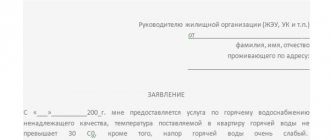Free legal consultation: +7 (499) 938-42-95 Moscow and region. +7 (812) 425-13-93 St. Petersburg and region. 8 (800) 333-42-87 other regions
Many residents of apartment buildings have already become accustomed to the lack of hot water; as a preventive measure, it does not happen every year for about 10 days in the summer.
Many managed to adapt and adapt. A shutdown of cold water in an apartment becomes a truly natural disaster for residents .
Dear readers! Our articles talk about typical ways to resolve legal issues, but each case is unique. If you want to find out how to solve your particular problem, please contact the online consultant form on the right or call the numbers below. It's fast and free!
Legislation
- The Civil Code of the Russian Federation regulates relations in the field of rights and contractual obligations. Article 1064 establishes the obligation to compensate for damage caused. A link to it may be needed if, due to the fault of utility services, a pipe breaks and property is damaged.
- The Housing Code of the Russian Federation defines the quality criteria for the provision of housing and communal services.
- Decree of the Government of the Russian Federation dated May 6, 2011 No. 354 “On the provision of utility services to owners and users of residential premises in apartment buildings” names the criteria for the quality of water supply, the payment procedure, and the recalculation mechanism. Contains permissible periods of interruptions in the supply of hot and cold water, as well as sanctions for exceeding them.
- Decree of the State Construction Committee of the Russian Federation dated September 27, 2003 No. 170 “On approval of rules and standards for the technical operation of housing stock” lists the requirements for the maintenance of the common property of apartment buildings, which includes communications.
- SanPiN 2.1.4.2496-09 “Hygienic requirements for ensuring the safety of hot water supply systems” establishes a maximum interruption of hot water supply for preventive purposes at 14 days.
- SNiP 2.04.02-84 “Water supply. External networks and structures” provides a definition of the standard pressure for water supply.
Hot water supply: concept and requirements
The absence of hot water for several hours or a whole day in the summer has long become the norm in new and old high-rise buildings. Many people take for granted the absence of water for more than 14 days or lukewarm water from a hot tap.
According to the standards, hot water supply provides the client with uninterrupted access to hot water supplied through a centralized pipeline, of established quality and in the appropriate volume, all day long
Government Decree No. 354, regulating the activities of public utilities, sets clear requirements for the quality of service:
- Twenty-four hour water supply throughout the year;
- Deviation from temperature norms at night (24.00-5.00) up to five degrees, during the day (5.00-24.00) up to three degrees;
- Supply of water whose quality complies with SanPiN;
- Providing water supply under pressure established by SNIP.
Legitimate reasons for turning off water in an apartment
Possibly for several reasons:
- If an emergency or natural disaster occurs. These are the main reasons for shutdowns without warning.
- The need for scheduled repairs. Cold and hot water should not be turned off at the same time. If we are talking about a break of several hours, then they must warn about this 24 hours in advance.
- If the consumer commits a crime and connects to the water supply without permission. The procedure requires an order from an authority.
- If it is revealed that the residents of the apartment are using devices whose power exceeds the permissible limits. The border can be found out from the technical passport of the residential building.
- If the commission has established that the pipes in the residential premises are in poor condition. The law establishes the responsibility of owners for repairs and maintenance of communications in the apartment. If the poor condition of the pipes threatens the supply of resources to the entire house, utilities disconnect irresponsible owners.
- Unpaid utility bills. It is important to know that the debt period is at least 3 months. Having a repayment schedule that is regularly observed by residents will not allow the water to be turned off. In addition, only hot water supply is subject to possible termination.
When can cold and hot water be turned off without warning?
Without warning the consumer about the shutdown, water supply may be interrupted by:
- in case of an emergency with equipment or water supply system,
- in case of emergency or natural disaster.
An emergency situation also arises due to improper care of the plumbing fixtures inside the consumer’s home. For example, a faucet broke or a pipe burst.
In this case, if the consumer is not at home or for some reason cannot eliminate the leak, if there is a threat of flooding of neighbors, then the riser is closed .
Is it legal to disconnect without warning?
When disconnecting, utility services are required to inform residents in advance. Typically, this practice is used in the case of repair or maintenance work. This is necessary so that people can prepare for the lack of a resource and stock up on water.
Dear readers! To solve your problem right now, get a free consultation
— contact the lawyer on duty in the online chat on the right or call: +7 (499) 938 6124 — Moscow and region.
+7 (812) 425 6761 — St. Petersburg and region. 8 (800) 350 8362 - Other regions of the Russian Federation You will not need to waste your time and nerves
- an experienced lawyer will solve all your problems!
However, the law provides for individual cases and notification is not required. This applies to emergency situations when the lack of water is not planned, and shutdowns for good reasons.
If residents are dishonest payers and have not received payments for three months in a row, the service provider will properly warn them about possible restrictions on the provision of the service. 20 days after becoming familiar with the consumer, if the debt is not paid, the service is limited, and after another 10 days the hot water supply is stopped.
Reasons for de-energizing DHW and cold water supply
Most often, the consumer does not know that the water supply is planned to be cut off. Moscow is a big city and cases often occur when the supply of hot water and cold water is carried out unscheduled. This may be due to an accident or emergency repair. In any case, the citizen suffers first and often does not know who to call in Moscow if there is no water.
There are emergency reasons that do not require warning. However, even for such cases, specific periods of time are prescribed during which utility companies must correct the situation. Utilities are required to comply with water shutoff standards and report in advance about an unscheduled interruption in the supply of the resource.
No housing office or management company has the right to schedule shutdowns for the autumn, spring or winter periods. This is why there is summer, when people go on vacation and stopping the supply of hot water will not cause serious inconvenience.
To find out the reason why there is no hot water, in Moscow in 2021 you need to call the emergency line at the number: 8-800-700-40-70. The cool center operators will indicate the reasons for the lack of water supply.
The following situations are common:
- accident;
- carrying out major repairs;
- pipe cleaning;
- connecting new facilities;
- problems with housing and communal services.
Note: utility companies are required to notify users 10 days before the start of work. The only exceptions are emergency situations.
Watch the video: “Where to complain if the water in the house is turned off outside of the plan.”
What to do if there is low water pressure in the apartment
There can be several reasons for poor pressure in the tap. Only after installing them can you understand what to do to restore it:
- Low pressure in the central water supply. Since global replacement of the pipe system of an apartment building requires capital investments of material resources and labor costs, utility companies are in no hurry to do this. It is much easier to reduce the water pressure in the system and, accordingly, the load on the pipes. It is also possible to connect the house to the water supply system of another apartment building. Thus, the number of consumers increases, but the throughput capacity of the pipes remains the same, so the pressure may decrease.
- Contamination of house risers. Due to poor water quality, deposits of lime and rust form in communications, which deteriorates the throughput of pipes;
- Low pressure is possible due to clogged pipes in a particular apartment. This is facilitated by various impurities in the water, as well as the limited service life of communications. Common plastic pipes will not completely protect against this risk. A blockage may form at the joint with the steel. Cleaning or complete replacement is carried out at the expense of the owner.
- If the water flows poorly or there is no water at all, the problem may be related to the faucet. A dirty cartridge, aerator or faucet axle may interfere with normal flow.
To determine exactly what the problem is in the apartment, you need to interview the neighbors. If they have the same situation, then the problem is in the communications that the house provides. If everything is fine with them, then the problem is in the pipes or faucet of the apartment, and you will have to fix it at your own expense.
To determine the norm of pressure when supplying water, SNiP 2.04.02-84 was developed. The maximum free pressure in the apartment should be 6 atmospheres. The minimum values are distributed as follows:
- for toilets - 0.2 atmospheres;
- for faucets on sinks - 0.2 atmospheres;
- for bathtub faucets – 0.3 atmospheres;
- for shower stalls - 0.3 atmospheres.
Where to contact
If residents find out that there is low pressure throughout the entire house, they need to contact the management company with a collective written statement.
It is compiled according to standard rules: the header indicates the addressee and the details of residents with addresses. The main part describes how rights have been violated and demands to find out the reasons and eliminate them. At the end is the date of compilation and signatures of all initiators.
It is advisable to draw up a complaint in 2 copies, register it in the office of the Criminal Code, and keep one as proof of the appeal. You can also send a complaint by registered mail with notification by mail.
Summer renovation campaign
Every year, in cities with central heating systems, hot water supply is temporarily stopped. This campaign takes place in the summer with the aim of preparing communications for the heating season. Work begins at the end of May and ends before September. Muscovites have to endure inconvenience for up to 10 days, although not so long ago repairs and maintenance could last more than two weeks.
Houses are switched off in order of priority, not simultaneously. A special schedule is drawn up in which a person can find his address and find out the dates of suspension of the hot water supply. If repairs according to the approved plan have not yet begun or have already been completed, but there is no water, residents need to notify the relevant organizations.
Where to call if disconnected
If there is no water, and there was no warning about the planned work, you need to contact the emergency dispatch service, management company or HOA to clarify the situation.
Their phone number can be easily found out from the monthly receipt for payment of technical maintenance or using an information stand near the house.
The dispatcher must be informed about the problem, full name, address of the premises where the shutdown was recorded. He must register the application, inform the applicant of the message registration number, his last name, first name, patronymic and explain why there is no water if he has this data. If there is no information, a specialist must be sent to check and identify the cause, the time of which corresponds to two hours.
Cold
If there is no cold water, you must contact the management company servicing the house, for example:
- Moscow: Management Company "Sweet Home", phone 225-30-78;
- St. Petersburg: Management Company "ZhKS No. 3 of the Central District", phone 274-25-54;
- Novosibirsk: Management Company "MKS-Novosibirsk", phone 279-03-79;
- Krasnodar: Management Company "Krasnodar", phone 991-21-00.
Hot
If there is no hot water, you need to call similar numbers. Management companies are responsible for the supply of both resources.
IMPORTANT! The law allows the duration of a break in the supply of hot water: a total of 8 hours during the month, at a time - 4 hours, and 24 hours in a row in case of an emergency (for example: in case of an accident in a dead-end main).
Who is responsible for poor quality services?
Before talking about the responsibility of officials, it is worth figuring out whether the water could have been turned off legally (perhaps there was an announcement, but you just didn’t notice it) and for how long.
If, after considering the application, it is determined that the water was turned off illegally or the period of non-provision of services has been exceeded, then you will have to answer:
- Management company servicing apartment buildings. It is she who is responsible for organizing public services for the high-rise building. If the company refers to debt, then such “evasion” is illegal. The procedure for providing communal services prohibits disconnecting a client who has fulfilled his obligations from the water supply. That is, if two or three apartments do not pay, you cannot turn off the water to the entire high-rise building;
- If the residents of an apartment building have created a cooperative or an Owners Association, then the governing bodies are responsible for water supply. Utility companies refer to the debt of the HOA as the subscriber with whom the agreement has been drawn up. However, the Resolution of the Presidium of the Supreme Court of the Russian Federation dated 03/07/2007 interprets the HOA as an intermediary, and not an end user. Therefore, the above-mentioned Procedure applies, according to which bona fide clients cannot be disconnected from services;
- When signing an agreement with a service company directly (Article 164 of the Housing Code), the culprit will be the company with which the agreement was signed.
So, what to do if hot water is turned off illegally:
- File a complaint;
- Make a recalculation for unused service;
- Demand that the culprit pay a fine (penalty) and compensation for losses incurred as a result of providing poor-quality service.
In addition, an administrative penalty may be imposed on the culprit under Article 7.23 of the Code of Administrative Offenses of Russia.
Where to complain if there is no water
If it is not available for more than 2 days after a planned outage necessary for repair work, residents must contact the management company, where they can file a complaint to restore the supply.
Cold
The interruption in cold water supply should be no more than 8 hours per month or 4 hours in a row to eliminate the consequences of an accident.
If there is no water for more than 2 days after scheduled repairs, this indicates poor organization of work. It is necessary to call the emergency dispatch service of the Criminal Code, and also write collective complaints there.
Hot
Interruptions in the supply of hot water during scheduled work should not exceed the standards established by SanPiN 2.1.4.2496-09: 14 days. If the deadline is delayed, it is necessary to require the management company to eliminate inconsistencies by calling the emergency dispatch service and writing complaints.
Rules for turning off water supply
If the cold water is turned off, you should first call in Moscow directly to the utility company that represents this resource. Some houses in the capital still receive hot water supply and hot water supply from the state Vodokanal, and this is where you should call and complain if the blackout is illegal.
The claim will be substantiated when consumers have identified disconnection violations and there is an evidence base. There are basic rules that experts recommend that public and private companies adhere to.
For planned major repairs of pipes or reconnection of a resource, residents are notified two weeks before the start of the event. Government Decree No. 354 prohibits turning off water supply without legal grounds.
The regulatory act prescribes the procedure for the provision of utility services, in particular hot water supply and cold water supply. Utility workers can violate any rules only if there is an order from local authorities to do so. Residents of apartment buildings must be notified of this one month in advance.
Making a complaint about lack of water
A complaint about the lack of hot or cold water supply is drawn up according to general rules and contains information:
- In the upper right part of the sheet the full name of the head of the management company and its name are indicated.
- The following is a list of the authors of the letter, their full names and addresses.
- Name – complaint or claim.
- The main part needs to describe in detail when the planned work was carried out and whether residents were warned about it, when it was supposed to be completed and how long in total people did not receive water. Next, demand that the Criminal Code eliminate violations.
- At the end, the date of drawing up the document is indicated, and all residents sign.
These rules can be used as a sample complaint or claim.
ADVICE! The appeal must be written in competent language using legal terms and references to legislation. Common language and insults are unacceptable. You cannot complain anonymously.
Who can help
Faced with the fact that the tap produces only a hissing sound, a natural question arises: for how long the water was turned off, who is to blame and where to complain. Supervision over the activities of the management company in accordance with Articles 13 and 20 of the Housing Code and paragraph 124 of Order No. 170 is carried out by state institutions and local authorities within the limits of their powers. Therefore, a complaint about the lack of hot water supply can be submitted to:
- District administration;
- Housing and Communal Services Department;
- Housing Inspectorate;
- Rospotrebnadzor;
- Local prosecutor's office.
How to submit
There are several ways to file a complaint. Either one has the same effect:
- Delivery to the management company personally by one of the residents. In this case, you need to have 2 copies of the complaint, register the appeal at the reception, and keep one for yourself.
- Send by registered mail with notification by mail.
- If it comes to a complaint to government authorities, you can use the Internet portals of the State Services or RosZhKKH.
The complaint is accompanied by certificates of ownership of the apartments, paid receipts for water, and an agreement for the provision of services.
Step-by-step instructions for the procedure
Before disconnecting communications, a number of measures are applied to debtors that can serve as a warning and motivate them to pay the receipts received. The first acceptable measure is the accrual of penalties. Each day of late payment allows for the accrual of penalties:
- in the period from 31 to 90 days, 1/1300 of the refinancing rate is charged;
- after 90 days , the rate increases to 1/130.
The accrual of penalties creates a precedent for the accumulation of debt obligations. The next step will be to notify the debtor, followed by stopping the supply of hot water.
The algorithm for legal actions of housing and communal services, which must be applied to the debtor when communications are disconnected, is specified in paragraph 119 of PP No. 354. It consists of the following mandatory actions:
- The supplier draws up an official notification of the debt, indicating its amount.
- Here it notifies you of the need to repay it within the prescribed period and warns about the permissibility of turning off the water in case of non-payment.
- If the debt is not partially or fully repaid, then the supply of hot water is limited, followed by termination.
- If it is technically impossible to limit its supply, the water is shut off without prior limitation.
The hot water supply limitation is valid for one calendar month, after which its supply is stopped.
Stopping the supply of hot water can be done in several ways:
- by installing a plug in the water pipe;
- by welding the drainage pipe leading to the debtor’s apartment;
- installing a special plug from the basement of the MKD.
All work to stop the flow of hot water is carried out at the expense of the debtor. Their value is added to the amount of the total debt. Shutting off the water must be accompanied by sealing the water supply source in order to avoid unauthorized establishment of the water supply. After disconnection and sealing, a service deactivation report should be drawn up.
Since the supplier’s goal is to collect funds, stopping the supply of services is only an interim measure. In the future, if the money does not arrive in the company’s account, it has the right to go to court to collect the full amount of the debt on the accounts, taking into account the accrual of penalties and costs for technical work to terminate the service. Obtaining a court decision allows you to collect the full amount of debt obligations through the Bailiff Service.
Notification to the debtor
Notifying the debtor consumer must be taken extremely seriously, since the slightest procedural violation can lead to the disconnection being declared illegal. The notification procedure has mandatory criteria that must be adhered to:
- timeliness;
- written form;
- presence of the signature of an authorized person and the company seal;
- confirmation of the fact of notification.
The debtor must be notified by a special document received by him against signature no later than 30 calendar days before the date of suspension or termination of water supply. In addition, he must be notified 3 days before the service is disconnected.
The text of the document must contain the following mandatory information:
- information about the performer and sender;
- information about the recipient and debtor;
- the fact of debt for the supply of water (other services), indicating the amount;
- admissibility of suspension or termination of water supply;
- obligation to repay debt;
- the number by which to pay the service provider.
In conclusion it should be stated:
- signature of the head of the company;
- Date of preparation;
- round stamp.
We do not recommend completing the documents yourself. Save time - contact our lawyers by phone:
8 (800) 350-14-90
The notice is given to the owner or responsible tenant against signature. If he refuses to sign for its receipt, the document must be sent by registered mail with acknowledgment of receipt.
It is imperative to obtain an inventory of the attachment from the post office operator in order to further confirm that a notice was sent to the debtor.
Only a notice drawn up by an appropriate organization has legal force. According to the provisions specified in paragraph 2 of Resolution No. 354, such an organization can be:
- resource supply company;
- HOA;
- UK.
The second notice may be made by regular mail, by telephone or orally. It serves as a reminder that the provisions specified in the initial notification have come into force.
Recalculation
If the apartment has water consumption meters installed, there is no problem of recalculation - accrual is made based on consumption. That is why the government obliges owners to install them. If there are no metering devices, in some cases recalculation is possible.
Is it allowed
Recalculation is legal if the owners pay for water according to consumption standards (when there are no meters): for each hour of exceeding the permissible interruption in water supply, the standard payment is reduced by 0.15% (provided that in a month the total non-supply of the resource was more than 8 hours, starting from 9 o’clock there is a decline).
Application for recalculation
It is drawn up in the name of the head of the resource supplying organization or water utility, since it is they who are entrusted with the responsibility of charging for water supply.
It is written in the standard manner: the header indicates the full name of the head and the name of the RSO. The main part describes the circumstances of the incident: why the water was turned off, how long the break lasted, how long the established period was exceeded (confirmed by the records of the emergency dispatch service log).
There is a requirement to recalculate. The application must be accompanied by acts drawn up jointly with the Criminal Code regarding the lack of water supply.
Responsibilities and responsibilities of the supplier for violation of deadlines
The duties and responsibilities of the utility service provider are specified in the contract, which guarantees uninterrupted water supply and maintenance of water quality in accordance with standards.
In case of violation of water shut-off standards, the utility service provider is liable to residents, which may include compensation for payments for water supply.
Every hour above the standard for lack of water saves 0.15% of residents' payments.
What to do
If the legitimate demands of residents remain unanswered, state authorities need to be involved in solving the problem.
If you receive a refusal to recalculate
If RSO refuses to recalculate, you should contact:
- The State Housing Inspectorate is a government body that controls public utilities and the performance of their duties.
- Rospotrebnadzor is an executive body that specializes in compliance with contractual obligations in all spheres of life, as well as in maintaining the sanitary and everyday well-being of citizens.
- The prosecutor's office is a supervisory authority, where you should complain only after contacting the previous authorities. Correspondence with utility companies and government agencies must be attached to the complaint. The prosecutor's powers allow him to punish not only public utilities, but also officials for inaction.
- Court. When causing material or moral harm.
If after treatment there is no water
Appeals must be written to the same authorities if, after applications to the Criminal Code, the filing has not resumed.
Is it legal to turn it off without a court order?
The procedure for turning off water to dishonest or unscrupulous consumers of utility services without a court decision is absolutely legal. But only on strictly defined grounds listed in Government Decree No. 354 (clause 119, paragraphs a, b, c): if there is a debt in the amount of two monthly payments according to the standard and its non-payment, improper maintenance of hot water communications in the apartment, illegal connection.
Turning off cold water is unacceptable under any circumstances. This is explained by the fact that the constitutional rights of the citizen will be violated, and the sanitary well-being of the entrance or home will also be endangered.
Mitigating Factors
You can always reach an agreement with the utility service if the consumer has objective reasons for delaying payments and does not refuse to repay the debt. Mitigating circumstances will be considered:
- All able-bodied citizens registered in housing earn amounts less than the subsistence level. Then they can qualify for low-income status and take advantage of subsidies from the state. It will take on part of the rent that exceeds the maximum established by law.
IMPORTANT! The law does not have retroactive effect, that is, the subsidy will be valid from the moment of registration, but there will be no recalculation for previous accruals. The debt will have to be paid in full.
- Delay of wages at the debtor's workplace. To do this, you must submit the appropriate certificate to the RSO. Then he will be given a deferred payment and the water will not be turned off.
- Accommodation in an apartment for a minor child or a disabled person. The law prohibits shutting off the water in this case.
- Temporary difficulties with the employment of citizens, provided that they take measures to solve the problems.
- Difficult financial situation for objective reasons.
If you want to avoid punitive measures, you must pay for the service provided in part, at least once every three months.
An individual approach to the consumer in the form of deferment, installment payments, cancellation of the decision to disconnect the hot water supply is possible only on an application basis. That is, citizens must initiate communication with the management of the RSO or management company and prove the temporary nature of material difficulties, demonstrate attempts to eliminate them and a willingness to bear obligations.
When can water be turned off for non-payment in a private home?
The supplier has the right to turn off water for non-payment in a private home only in a situation if he does everything in accordance with the legislation of the Russian Federation.
Rules for terminating water supply for non-payment:
- The size of the debt should not affect this. The only reason for turning off water is the lack of payment for three months;
- If the owner of the real estate who has a debt to the service provider was not properly notified about turning off the water thirty days in advance, as well as an additional three days, then it cannot be done.










